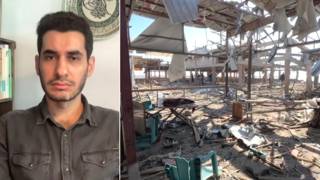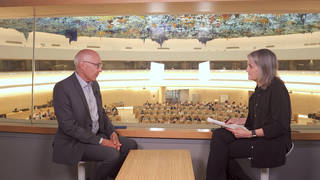
Guests
- Mukoma Wa Ngugiassociate professor of literatures in English at Cornell University and co-founder of the Safal-Cornell Kiswahili Prize for African Writing.
- Caroline ElkinsPulitzer Prize-winning author and professor of African and African American history at Harvard University.
The death of Queen Elizabeth II has focused global attention on the British royal family and renewed criticism of the monarchy both inside the U.K. and abroad, especially among peoples colonized by Britain. “There’s a degree of psychosis that you can go to another people’s land, colonize them, and then expect them to honor you at the same time,” says Kenyan American author Mukoma Wa Ngugi, who teaches literature at Cornell University and whose own family was deeply impacted by the bloody British suppression of the Mau Mau revolution. He says that with Queen Elizabeth’s death, there needs to be a “dismantling” of the Commonwealth and a real reckoning with colonial abuses. We also speak with Harvard historian Caroline Elkins, a leading scholar of British colonialism, who says that while it’s unclear how much Queen Elizabeth personally knew about concentration camps, torture and other abuses in Kenya during her early reign, the monarchy must reckon with that legacy. “Serious crimes happened on the queen’s imperial watch. In fact, her picture hung in every detention camp in Kenya as detainees were beaten in order to exact their loyalty to the British crown,” says Elkins.
Transcript
AMY GOODMAN: As the world marks the death of Queen Elizabeth II, we begin today’s show looking at how she had many subjects throughout the former British Empire, and not all are mourning her death equally. Buckingham Palace has announced the state funeral for Queen Elizabeth II will take place at Westminster Abbey on September 19th. The queen’s body will lie in state at the Houses of Parliament beginning on Wednesday. On Friday, King Charles III gave his first public remarks since assuming the throne following the death of his mother.
KING CHARLES III: In taking up these responsibilities, I shall strive to follow the inspiring example I have been set in upholding constitutional government and to seek the peace, harmony and prosperity of the peoples of these islands and of the Commonwealth realms and territories throughout the world.
AMY GOODMAN: Over the weekend, at least two people were arrested in Britain for publicly criticizing the monarchy. The activist Symon Hill said he was arrested in Oxford after yelling out, quote, “Who elected him?” during a ceremony honoring King Charles III.
For more on British colonial violence and its legacy, we’re joined by two guests.
Caroline Elkins is professor of African and African American history at Harvard University. Her most recent book is titled Legacy of Violence: A History of the British Empire. She was awarded the 2006 Pulitzer Prize for General Nonfiction for her first book, Imperial Reckoning: The Untold Story of Britain’s Gulag in Kenya. Her research into Britain’s brutal suppression of the Mau Mau movement in Kenya in the ’50s resulted in a court case and helped lead to awarding of reparations to more than 5,200 surviving Kenyans who were subjected to systematic torture and abuse under British rule.
Also with us, Mukoma Wa Ngugi, associate professor of literatures in English at Cornell University. His most recent book is titled Unbury Our Dead with Song. He’s the co-founder of the Safal-Cornell Kiswahili Prize for African Writing. In 2020, he was part of the initiative at Cornell to change the department’s name from Department of English to Literatures in English. He’s the son of the world-renowned Kenyan author Ngugi wa Thiong’o. After Queen Elizabeth died, our guest wrote, “My uncle was deaf. He was asked by British soldiers to stop. Of course he did not hear them. They shot him dead. My other uncle was in the Mau Mau. My grandmother hid bullets for him. Colonialism happened to real people. It is absolute madness to expect us to mourn the queen.”
Professor Mukoma Wa Ngugi and Caroline Elkins, we welcome you both to Democracy Now! Professor Ngugi, let’s begin with you. Your response to the death of the queen, the monarch who reigned for 70 years, and what she meant for Africa, and specifically your country, Kenya?
MUKOMA WA NGUGI: Yeah. So, what I’ve been thinking about over the last few days is how my family got affected — right? — got affected by British colonialism. Right? And so, yeah, in my tweet, I mentioned about my uncle, who was deaf. He couldn’t hear the soldiers, you know, the British soldiers, so they shot him. And also, my other uncle, who was in the Mau Mau, you know, in the Kenya Land and Freedom Army.
But what’s become interesting to me now is the intimacy of colonialism, right? Because I was talking with my father the other day, and he told me the story about how we also had a home guard, a loyalist, in our family, his brother — one of his brothers was a loyalist, the other one was in the Mau Mau — and how at some point they went to my grandmother’s place at the same time, you know, and they both ran away. Right? In my own case, my name, Mukoma, I’m named after a chief, who was called Mukoma, of course, yeah, who was forced off land in this really beautiful placed called Tigoni, and him and his people then were forced off the land and taken to a very, very arid area. Right? So, I think what I want people to think about is that these questions of colonialism, they happened to real people. Right? Like, there is no — it happened to real people.
AMY GOODMAN: If you could share for our audience, our audience in the United States and around the world, who are not familiar with Kenya’s history, going back in time and back to the British colonial time, when it became a colony, Kenya’s independence, and who the Mau Mau were?
MUKOMA WA NGUGI: Yes. So, the Mau Mau were — people call it a rebellion, but really we should really call it a revolution, right? You know, so we should say they were revolutionaries. But, OK, British colonialism was brutal. There is no other way of putting it. Right? And then, when the Kenyans started resisting, the British government declared a state of emergency, in which case then a lot of Kenyans were taken into detention camps. In fact, the school I went to, called Genya [phon.], we also called it Manyani because it was a former concentration camp. Right? So, it was very, very brutal. The resistance itself, we don’t give it enough historical breath. Right? Because a lot of people talk about it as a queer affair or, you know, like a very narrow movement, but it actually involved the whole Kenyan society, so you have Kenyan Indians who are supporting the Mau Mau, different ethnicities and so on and so forth.
For the audience in the United States, I would say, quoting a writer who wrote So Many Hungers!, “Oppression breeds resistance.” Right? You can’t have oppression without resistance. So, yeah, we had the resistance. Come independence, the betrayal happened, right? So, OK, there were factions within the independence movement. So the betrayal happened, where you ended up with a president who actually at some point — this is Jomo Kenyatta, who at some point called the Mau Mau “terrorists.” Right?
But I want to mention a bit of irony here, that in Kenya now we are mourning. There is a four-day — the current president declared a four-day mourning period for the queen. But his father, Jomo Kenyatta, he himself was actually jailed and detained by the British. Right? So, I think there are two levels here. One is governmental responses or the larger structural political issues, but then the other level is what people are saying themselves. Right? So, yes, so we have neocolonial government, just to put it bluntly — right? — that’s not respecting the wishes of the majority of Kenyans, you know, who were affected by British colonialism.
AMY GOODMAN: I mean, the queen had a special relationship with Kenya, not only, though it is interesting, that she learned of her own father’s death, which led to her ascension as queen, when she was visiting Kenya. The significance of this, Professor Ngugi?
MUKOMA WA NGUGI: Yeah. So, it’s one of the ironies, historical ironies — right? — that she became queen of Kenya, but at the same time, when the repression against Kenyans was actually becoming not just visible but also vicious — you know, detention camps, murders, wanton shootings and so on and so forth. There is an obsession, I think, within the monarchy — right? — of having these territories. In the headlines, King Charles — you quoted King Charles — right? — where he was saying, you know, that we have realms, territories and so on and so forth. But that is — I don’t know. For me, I think it’s a degree of psychosis — right? — that you can go to another people’s land, colonize them, you know, and then expect them to honor you at the same time, right? The fact that Kenya has entered four days of mourning for the queen actually captures that whole absurdity, right? Yeah, I don’t know. Like, there’s a part of me that finds all this so — like so, I don’t know, silly, to put it that way. Like, so, yeah, the queen became the queen in Kenya at the same time there were murders, assassinations, you know, and just good old-fashioned corruption and so on and so forth. Right? And then, at the same time, we are expected to mourn, you know, to mourn the queen. Yeah.
AMY GOODMAN: I wanted to bring Professor Caroline Elkins into this conversation, your colleague at Harvard, with the African and African-American history department, author of Legacy of Violence: A History of the British Empire. You won the 2006 Pulitzer Prize for your book Imperial Reckoning: The Untold Story of Britain’s Gulag in Kenya. Tell us that story and how — I mean, most of, of course, the reason that the reparations went to so many Kenyans, thousands of them, was because of their activism, but because of your book, as well.
CAROLINE ELKINS: Well, thank you so much for having me today.
You know, I think a few things here. First of all, the book itself, Imperial Reckoning, really picked up on where — what the literature — and I mean literature — told us. Mukoma’s father, Nguigi wa Thiong’o, had written about this in literary form. Humanists are often one or two steps at least ahead of historians. But I was determined to tell the full story of these detention camps, that were set up on a massive scale. Nearly 1.5 million Kikuyu, or Africans, were detained in detention camps, or emergency villages, barbed-wire villages, as a way of suppressing Mau Mau. These documents were then — they denied at the time, first under Churchill and then his successors and finally Macmillan. They denied any wrongdoing. And when allegations did surface that had some credibility, they explained it as the fault of a one-off, so-called bad apples. Instead what we find is that when we piece this story back together again, that this was a story about systematic violence, torture, murder and massive cover-up. And the bottom line is that serious crimes happened on the queen’s imperial watch. In fact, her picture hung in every detention camp in Kenya as detainees were beaten in order to exact their loyalty to the British crown.
And the question that remains now, that I think we’re debating, in some ways, is: How much did she know, and what did knowing mean? Number one. And how do we reconcile this moment in time, particularly in Kenya, around her death? And I think it’s here where, one, I think, first of all, we should honor those individuals, those whose families experienced this, Mukoma’s and others’, to choose not to mourn. And certainly, based on the history we know, it is their decision to do so and absolutely within their right to do so and quite justifiable.
At the same time, what I find very interesting is, getting back to Mukoma’s point about current President Kenyatta, in fact, with many others, when this case happened at the High Court of London, five claimants, initially test claimants, sued the British government for systematic torture and violence in the detention camps in Kenya in the 1950s, and four years later, the British government settled the case, as you noted in your remarks. But for each of those five claimants that came to London, they each believed that they were appealing not to the British government, but to the queen. The person they wanted to see most was the queen. And one of them, Wambugu Wa Nyingi, said in his statement, and I quote in my recent book, “If I could speak to the queen, this is what I would tell her.” And he says that under her watch, British government tortured [him], but that he did not hold her personally responsible. And so, when I step back and look at this, what I see as some of her power is not only that these — the extraction of wealth and land and the rest, but the fact that she herself, as her predecessors did, wrapped herself in empire, deflected from what was being carried out in her name, and beckoned colonial subjects, like Wambugu, to revere her. And to this day, many still do. And in some ways — in some ways, that’s how we can explain how governments, like the current one in Kenya, are calling for four days of national mourning.
AMY GOODMAN: Can you talk more extensively about the Mau Mau rebellion, what professor Ngugi called really a revolution, and what the British did to them in Kenya?
CAROLINE ELKINS: Absolutely, a hugely important question, right? Because I think the Mau Mau, in a nutshell, was an anti-colonial and a civil war. It was anti-colonial in that it was those who joined the movement, and they took an oath of allegiance, and nearly 1.5 million Kikuyu, the British government estimated, about 90% took what was considered the first oath of allegiance to the movement. So this was a massive movement, and they were demanding ithaka na wiathi, or land and freedom, from the British government. And as a way to suppress that, the British government rounded up and detained nearly all of them, nearly 1.5 million. It was also a guerrilla war, about 20,000 or 30,000 fled to the forests, and there was a classic, if you will, sort of military action within this. But the British government gained the initiative over the forest war, as it’s called, within two years of the war — right? — so from 1952 to 1954.
But the state of emergency that had been declared extends from 1954 to 1960. And it’s during that period of time — that’s the period of time that I largely focused on in Imperial Reckoning. It’s during that period of time where they exacted extraordinary torture, forced labor, punishment, starvation, in order to get the detainees and those who were detained in emergency villages to renounce their allegiance to Mau Mau, to adopt their allegiance back to the British and to the crown and to Her Majesty, in order to be released from the camps and to become, as they considered themselves to be, quote-unquote, the “British civilized subjects.” And so, that’s at the heart of both Mau Mau, what they are demanding, and the British government.
Ultimately, the British government — it becomes a war of attrition. The British government ultimately decides to decolonize or leave Kenya in 1963, after it is caught red-handed in 1959 with the — what’s called the Hola massacre, where 11 detainees were beaten to death in Hola detention camp. And what’s different about this — it wasn’t an exceptional moment, but what’s difference about this is they get caught red-handed, and they can’t explain it away. There’s a huge uproar in Parliament about this. It is explained to the queen by then-Prime Minister Harold Macmillan that this was an unfortunate incident based upon the actions of quite minor officials, when, in fact, of course, we know now as historians, which I sort of exposed within Imperial Reckoning, that this was the long — the end of a long pattern, six years of brutal torture, murder and starvation tactics, along with forced labor, in these camps of Kenya.
AMY GOODMAN: So, when we look at the cost of the funeral alone, India’s Economic Times says the funeral is expected to cost 6 billion pounds, not to mention the expenditures of the royal family over these decades. How much of that money comes from the pain and suffering of the people of Kenya? What were the resources in Kenya? Of course, most importantly, human resources. But what was Britain extracting from Kenya?
CAROLINE ELKINS: Mm-hmm, mm-hmm. Yeah, I think, look, this is an enormous question you touched on, Amy, and one that we’re not going to settle in the context of our few minutes here. But I can tell you this. The British government — the moment the queen ascended, in February of 1952, the British government was reeling from the postwar effects, and its economy was in tatters. It decides that it is going to rebuild its economy and its position as part of the big three on the international global stage on the backs of its colonized people through a policy called imperial resurgence. And Kenya becomes an incredibly important part of this, with its tea and coffee export economy, because Britain needed this money within its monetary policy — we don’t need to get into the details about it — they needed this in order to bolster the pound sterling, pay back loans from the war and rebuild its economy.
So there’s no question whatsoever — I think I’m answering your question in a slightly different way, but there’s no question that during Queen Victoria’s reign — Kenya would be one example, Malaya, with its rubber exports, Ghana, with its cocoa — that her government, her economy, her nation rebuilt itself on the backs of empire. And that, I think, we’re fairly unequivocal about. So, the question becomes today, in getting back to some of Mukoma’s points, it’s not just the mourning, but it’s thinking about who is — you know, and this, you’d be guaranteed this [inaudible], like, every single royal occasion, frankly, since Queen Victoria in the 19th century, and certainly under Queen Elizabeth, every royal occasion is an imperial one. So, not only will they be spending money, in some ways, in sort of an elliptical manner, that comes from empire over the years, but they will also be holding out the symbols, the signs, the images of empire through medals and statues and the like, reinforcing imperial greatness. And that imperial greatness is inextricably linked to Britain’s monarchy.
AMY GOODMAN: Do you see reparations being a very real now and prominent issue as the queen dies and Charles becomes king?
CAROLINE ELKINS: Unquestionably. Look, I think that — you know, a few things. I think these have — there was the case that you gestured to, the Mau Mau case, which I was involved in as an expert witness. But particularly in recent years, the King Charles III and the royal family have become well aware of global demands for a kind of global British imperial reckoning, if you will, based upon the protests, based upon the petitions from formerly colonized people and those still living in Commonwealth realms. It is unquestionable, as well — we can debate all we want how much the queen knew at the time about what was going on. There is no debate whatsoever that this current king has the knowledge that serious crimes happened on his mother’s imperial watch.
And it’s up to him at this point to jettison, in some ways, the tradition that his mother held so dear, revise — and going back to the speech that you played early in our program, where he also speaks to Britain’s unique history of — and, quote-unquote, “unique history,” and I would add “of imperial benevolence,” that she cultivated and affirmed for 70 years. And he has to reconcile with that. He has to speak to these questions of reparations. The alternative is to simply carry on. And that’s only going to hasten the monarchy’s demise. And that, I feel fairly confident in saying.
AMY GOODMAN: Professor Mukoma Wa Ngugi, we give you the final word. What do you demand, now that Prince Charles has become King Charles III?
MUKOMA WA NGUGI: So, what I would like to see is the dismantling of this notion of the Commonwealth. Right? You know, I was thinking about the name earlier, from a writerly perspective, “Commonwealth.” Whose wealth? But the way I’ve been thinking about all these issues is actually through slavery, right? So, the book I’m working on now on Africans and African Americans took me to Keta in Ghana. Right? Keta is where slaves were being taken from, and it’s a very depressed — you know, the aftershocks, if you want to call it that, or the trauma of slavery, still it’s evident. Right? It’s poor, depressed and so on and so forth. Maya Angelou called it melancholic, actually.
Then, from there, I left Keta, then I went to Bristol in England. Right? Bristol was a slave-trading port, where, you know, yeah — and it’s thriving. It looks like a good old-fashioned Bohemian town. Most people know it now because of the dismantling of the statue of Colston, who was one of the slave traders. But at any rate, we can see the effects of slavery. Right? We can see the effects of colonialism. And we can see how the wealth of England was built. Eric Williams, you know, called it — talking about Liverpool, said that there’s no brick in Liverpool that doesn’t have slave blood on it. Right?
But I have no faith in King Charles. I mean, I have no faith in him at all. But what’s interesting to me now is the groundswell, you know, the groundswell of Africans who are affected by colonialism. And, OK, maybe I should just call it the Global South, right? I think now there’s a consciousness that we don’t need England — right? — either materially or psychologically. Right? So, yeah, I would say my faith is with the people in the Global South, not the monarchy.
AMY GOODMAN: Professor Mukoma Wa Ngugi, we thank you so much for being with us, associate professor of literatures in English at Cornell University, and Caroline Elkins, professor of African and African American history at Harvard University. Legacy of Violence: A History of the British Empire is her book, and the Pulitzer Prize-winning Imperial Reckoning: The Untold Story of Britain’s Gulag in Kenya.
Next up, it’s been almost two years since Newark police killed Carl Dorsey. His family has just filed a civil lawsuit. We’ll speak with his sister. Stay with us.
[break]
AMY GOODMAN: “How?” by John Lennon. The British musician John Lennon returned his MBE, an honorary title, to the queen in protest over Britain’s role in the war in Biafra.













Media Options